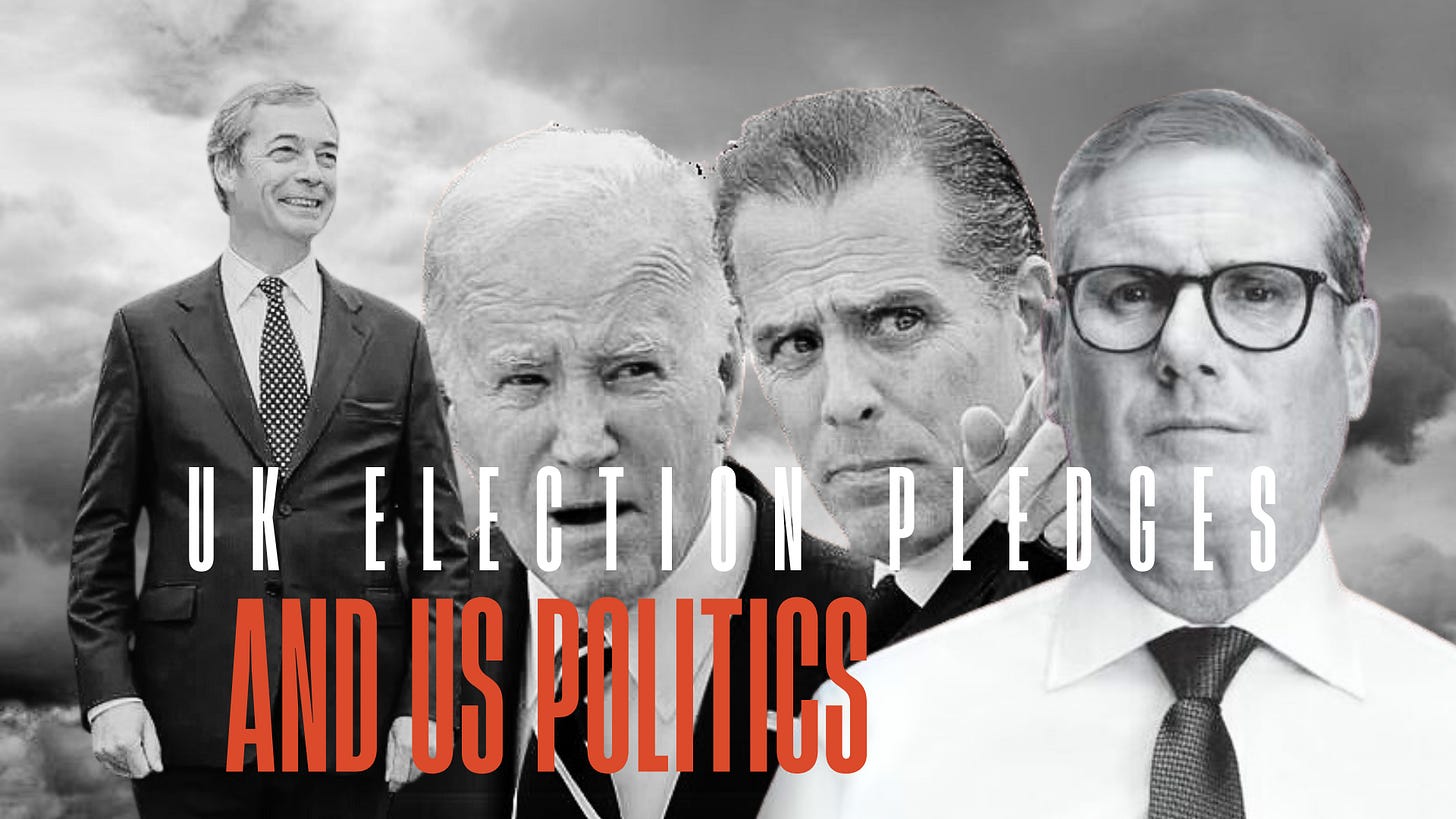In the latest episode of Mid Atlantic, I was joined by an expert panel featuring Ira Shapiro, Aaron Fisher, Steve O'Neill, Tonye Altrade, and Michael Donoghue for a look at the critical political developments in the UK and the US over the last seven days.
As the UK geared up for its next general election, the major political parties unveiled their manifestos, outlining their key pledges and strategies. As Steve O'Neill put it, "The thing with manifestos, they are in some way shopping lists of policies, but they also tell a story. Labour's manifesto tries to tell a story about the kind of government Keir Starmer wants to run." Labour's manifesto, with its focus on improvements in public services, reducing NHS waiting times, and reintroducing public ownership for key services like railways, provided no surprises. The party's cautious approach aimed to avoid unsettling middle England, under-promising in hopes of over-delivering.
In contrast, Tonye Altrade critiqued the Conservative manifesto for its lack of coherence. "There was no story whatsoever I could glean from the Conservative manifesto. It was a ramshackle of different things, some bold, some pandering to far-right wingers." The Conservative manifesto, with pledges to cut taxes, introduce national service, and maintain strict border controls, lacked a clear vision of the kind of country they aimed to create after 14 years of misrule, leaving many voters unconvinced.
The Liberal Democrats, meanwhile, focused on issues like mental health, small business support, and housing, promising 300,000 new houses a year. Due to an unconventional campaign featuring leader Ed Davey in humorous and relatable situations, they managed to command a larger slice of the media pie than usual. Altrade added a note of caution, "I trust that they will stick regularly to their ideologies, but whether they can actually execute and deliver would be my reservations."
The Reform Party, now led by Nigel Farage, presented a manifesto reminiscent of Thatcher-era policies, emphasising tax cuts, reducing public spending, and stricter immigration controls. However, as I summarised, "It sounded like Margaret Thatcher's greatest hits have been reissued."
With a brief mention of the UK leaders' debate, we moved on to the US and President Joe Biden's response to his son Hunter Biden's conviction on felony gun charges and a notable meeting between Senate Minority Leader Mitch McConnell and former President Donald Trump. Ira Shapiro, back on the podcast after time in Europe, reflected on the McConnell-Trump meeting, dismissing its significance. "McConnell staying with Trump despite their differences showed the extent of partisanship. It was clear McConnell would support the nominee, no matter who it was."
Aram Fischer added context, explaining that the meeting was an attempt to project a unified Republican Party ahead of the 2024 elections. "It was an effort to show that they were a unified party, that Trump was the presumptive nominee, and they were in with Trump, irrespective of everything that happened." Michael Donoghue emphasised the transactional nature of the current Republican dynamics. "They didn't have any other choice; they were trapped together. It was like a marriage where there was no love any longer, but they just felt like there was no way to survive any other way."
The panel also discussed Biden's efforts to re-engage with key voting blocs, particularly black voters. I noted that Biden took steps to re-engage with black voters, appearing alongside Kamala Harris in Philadelphia. How effective this would be remained to be seen, but it was a crucial part of his campaign strategy. Aram remained sceptical of the Democrats losing significant black male votes as the opinion polls had been so off, constantly under-representing millennials' voting habits.
Amidst these discussions, the panel reflected on the broader political landscape in the US, with Shapiro highlighting the potential dangers of a second Trump presidency. "While there were reasons that Trump was able to be elected in 2016, the idea that he could possibly be elected now, after everything we've seen, would be a very serious situation."
Now, more than ever, it is essential for those who are left of centre to register and vote. The stakes are high on both sides of the Atlantic. After 14 years, Britain is broken, and in the US, it’s not just a case of championing social justice and equality – democracy is at stake. Make your voice heard at the ballot box in 2024.















Share this post